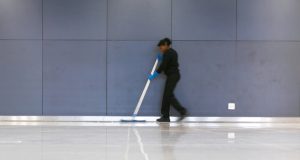PRIORITIES, FOUNDATIONS & VARIETY
According to our research, the top five budget priorities for FMs embarking on workplace change are technology (14 per cent), informal areas to collaborate (10 per cent), social spaces to meet and relax with colleagues (8 per cent), quiet and confidential spaces (8 per cent) and areas for wellbeing (8 per cent). In workplace terms this can be translated into four key types of amenity – spaces for: focus and process, collaboration and meeting, knowledge and learning and socialising and restoration.
FMs striving to create future-ready workplaces can use these insights to ensure workplaces offer comfort and efficiency (beyond basic universal needs such as heat, light, ventilation), but they must remember three other factors that will determine success.
The first is trust. Employees must feel empowered and trusted to work as they desire – without it, even the most agile workspace won’t deliver. The second is the technology required to enable the seamless use of a workplace by a transient population. Digital ways to book meeting rooms, parking and desks for example, help to manage the availability of amenity and anticipate usage.
The third consideration is choice – as choice underpins comfort. This requires the provision of various work settings (sofa, standing desk, private booth, collaboration kitchen table) to suit different tasks and user preferences, as well as catering for other comfort needs such as providing showers and wellbeing facilities, and ensuring diversity, inclusion, belonging and equality has informed design.
It’s these changing wants that are the driving force behind the destination office.
THE DESTINATION OFFICE
This term refers to the emerging reality that workplaces have to become destinations and offer compelling reasons to visit – largely by providing the experiences that people can’t get working from home. Destination offices achieve this by offering variety in order to deliver an experience, encourage innovation, support development, create a sense of satisfaction, flex as needs change and support social activity.
For FMs keen to curate desirable and efficient workplaces that appeal to our post-COVID behaviours – it pays to understand and incorporate the eight key components of the destination office:
- Library –The home for an organisation’s knowledge. This might be physical storage for reference materials or a quiet place for study.
- Forum – A multi-use and adaptable space, designed to help bring organisations together as a whole in townhall gatherings, informal meetings and company social events.
- The coffee shop – The convivial social heart of an organisation – a place to meet and mingle, forge connections and friendships.
- The department store – A resource hub, where services such as IT, HR and FM are easily accessed. It can be a place for trouble-shooting and discussing changing workplace protocols.
- Academy – A combination of formal, informal and tech-rich spaces for learning, coaching and mentoring.
- Park – A space with biophilia, health and wellbeing at its heart. Whether inside or outside, these spaces include gyms, garden terraces and calming spaces to relax.
- Gallery – The showcase space for an organisation to communicate its vision, values and purpose to visitors and co-workers.
- Co-working bureau – Shared rather than owned spaces that support specific activities (collaboration, concentrated work) and are flexible, tech-rich and agile.
There has never been a time where change has happened so quickly or when the previously accepted norms of work have been so totally transformed. Organisations and their FMs, can leverage this once in a lifetime opportunity to reimagine how work gets done.
To ensure that future workplace design reflects these changes and offer an individual and optimum workplace experience for everyone, organisations must familiarise themselves with the expectations of Conor, Irie, Mark and Shona. This is crucial to support how work is done, as well as attract and retain the best talent. Hybrid working is now a permanent expectation among the talent pool.
FMs are in a unique position to steer workplace change. In fact its reinvention is already underway. The question is do you have a destination office to meet the needs of Conor, Irie, Mark and Shona?





